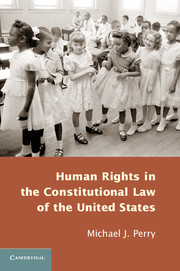Book contents
- Frontmatter
- Dedication
- Contents
- About the Author
- Introduction: Human Rights in the Constitutional Law of the United States
- Part I The Morality of Human Rights
- Part II The Constitutional Morality of the United States
- 4 Capital Punishment
- 5 The Question of Judicial Deference
- 6 The Right to Moral Equality
- 7 The Right to Religious and Moral Freedom
- 8 Same-Sex Marriage
- 9 Abortion
- Concluding Note
- Index
- References
5 - The Question of Judicial Deference
Published online by Cambridge University Press: 05 July 2013
- Frontmatter
- Dedication
- Contents
- About the Author
- Introduction: Human Rights in the Constitutional Law of the United States
- Part I The Morality of Human Rights
- Part II The Constitutional Morality of the United States
- 4 Capital Punishment
- 5 The Question of Judicial Deference
- 6 The Right to Moral Equality
- 7 The Right to Religious and Moral Freedom
- 8 Same-Sex Marriage
- 9 Abortion
- Concluding Note
- Index
- References
Summary
Assuming that the Supreme Court of the United States (SCOTUS) should play some role in protecting the constitutional morality of the United States, what role – how large or small a role – should it play? More precisely: In exercising judicial review of a certain sort – judicial review to determine whether a law (or other public policy) claimed to violate a right that is part of the constitutional morality of the United States does in fact violate the right – should SCOTUS inquire whether in its own judgment the law violates the right? Or, instead, should SCOTUS proceed deferentially – deferentially in relation to the lawmakers – inquiring only whether the lawmakers’ judgment that the law does not violate the right is a reasonable one?
IT HAS BEEN THE SUBJECT OF RENEWED CONTROVERSY, in recent years, what role a democracy should authorize its judiciary to play in the democracy's effort to protect human rights. Most democracies, in their effort to protect human rights, have entrenched some human rights in their constitutional law. Some scholars have argued, however, that an appropriately thoroughgoing commitment to democratic lawmaking should lead a democracy to stop short of authorizing its courts to enforce whatever human rights are constitutionally entrenched. What's the point of a democracy's entrenching human rights in its constitutional law, one might wonder, if the democracy does not also authorize its courts to enforce the rights? Something Albert Venn Dicey wrote in An Introduction to the Study of the Law of the Constitution (1885) points to an answer: “The restrictions placed on the action of the legislature under the French constitution are not in reality laws, since they are not rules which in the last resort will be enforced by the courts.
- Type
- Chapter
- Information
- Human Rights in the Constitutional Law of the United States , pp. 92 - 104Publisher: Cambridge University PressPrint publication year: 2013



